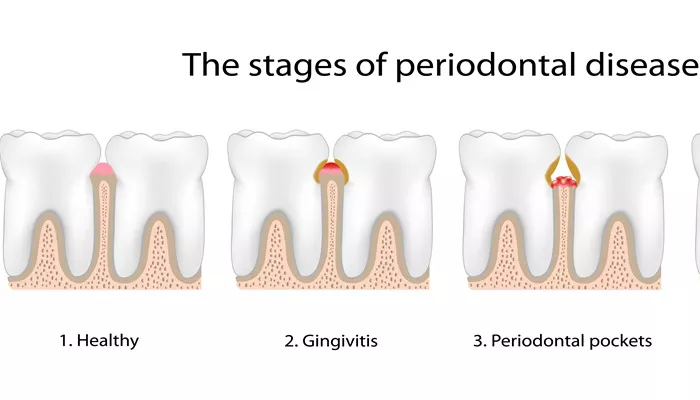Periodontal disease, commonly referred to as gum disease, is a prevalent oral health issue that affects a large segment of the population. It is characterized by inflammation of the gums and surrounding tissues, often leading to discomfort, tooth loss, and potential systemic health problems. Given its high incidence and the significant impact it can have on one’s overall well-being, the question arises: Can periodontal disease be stopped? The answer is yes, but it requires a comprehensive understanding of the disease and a commitment to proper oral hygiene practices.
Understanding Periodontal Disease
Periodontal disease is primarily caused by the accumulation of plaque on teeth. Plaque is a sticky, colorless film of bacteria that forms on teeth and gums. If not removed regularly through brushing and flossing, plaque can harden into tartar (calculus), which is difficult to remove and provides a rough surface for more plaque to accumulate. This bacterial accumulation leads to inflammation of the gums, causing gingivitis, which is the mildest form of periodontal disease.
If gingivitis is not treated, it can progress to periodontitis, a more severe form of periodontal disease. In periodontitis, the inflammation extends below the gum line, affecting the bones and ligaments that support the teeth. This can lead to the formation of periodontal pockets, which are spaces between the gums and teeth that become filled with bacteria, plaque, and tartar. Over time, these pockets can deepen, causing further destruction of the gums, bones, and supporting tissues, potentially leading to tooth loss.
Preventive Measures to Stop Periodontal Disease
Stopping periodontal disease involves a combination of preventive measures, early diagnosis, and timely treatment. Here are some key steps that individuals can take to prevent or manage periodontal disease:
1. Maintain Good Oral Hygiene
The cornerstone of preventing periodontal disease is maintaining good oral hygiene. This includes brushing teeth at least twice a day with fluoride toothpaste, which helps to remove plaque and prevent cavities. Flossing daily is also crucial, as it removes food particles and plaque from between teeth and under the gum line, areas that a toothbrush cannot reach.
In addition to brushing and flossing, using an antiseptic mouthwash can help to reduce the number of bacteria in the mouth and freshen breath. It is important to note that mouthwash should not be used as a substitute for brushing and flossing but rather as an additional step in the oral hygiene routine.
2. Regular Dental Check-ups and Cleanings
Regular dental check-ups and cleanings are essential for preventing periodontal disease. During a dental check-up, a dentist will examine the teeth, gums, and supporting structures for signs of disease. They may also take X-rays to detect any underlying issues that are not visible during a visual examination.
Dental cleanings involve removing plaque and tartar from the teeth and gums using special tools and techniques. This helps to prevent the accumulation of bacteria and reduce the risk of inflammation. Regular cleanings also allow a dentist to monitor the health of the teeth and gums and address any potential problems before they become severe.
3. Healthy Diet and Lifestyle Choices
A healthy diet and lifestyle choices can also play a significant role in preventing periodontal disease. Eating a balanced diet that is rich in vitamins and minerals, especially vitamin C and calcium, can help to strengthen the teeth and gums. Avoiding sugary snacks and drinks can also help to reduce the risk of cavities and gum inflammation.
Smoking is a major risk factor for periodontal disease. It weakens the immune system, making it more difficult for the body to fight off infections. Smoking also reduces blood flow to the gums, making it harder for them to heal and repair damage.
Quitting smoking can significantly reduce the risk of developing periodontal disease and improve overall oral health.
4. Addressing Underlying Health Conditions
Certain medical conditions, such as diabetes, can increase the risk of developing periodontal disease. Managing these conditions effectively can help to reduce the risk of gum inflammation and other oral health problems. It is important to maintain good communication with a healthcare provider and follow their recommendations for managing any underlying health conditions.
Early Diagnosis and Treatment
Even with good oral hygiene and preventive measures, periodontal disease can still develop. Therefore, it is important to recognize the signs and symptoms of gum disease and seek treatment as soon as possible. Common signs of periodontal disease include red, swollen, or bleeding gums, persistent bad breath, and sensitivity or pain when chewing.
If periodontal disease is diagnosed, treatment options may include scaling and root planing, which involves removing plaque and tartar from the teeth and smoothing the root surfaces to prevent bacteria from adhering to them. In severe cases, surgery may be required to remove infected tissue and restore the health of the gums and bones.
Conclusion
In conclusion, periodontal disease is a prevalent oral health issue that can have a significant impact on one’s overall well-being. However, it is possible to stop periodontal disease through a combination of preventive measures, early diagnosis, and timely treatment. Maintaining good oral hygiene, regular dental check-ups and cleanings, a healthy diet and lifestyle choices, and addressing underlying health conditions can all help to reduce the risk of developing gum disease.
By taking these steps, individuals can protect their teeth and gums from the damaging effects of periodontal disease and enjoy a healthier, more confident smile. Remember, prevention is always the best approach to maintaining good oral health, so don’t wait for symptoms to appear before taking action. Make oral hygiene a priority and visit a dentist regularly for professional advice and care.
Related topics:

